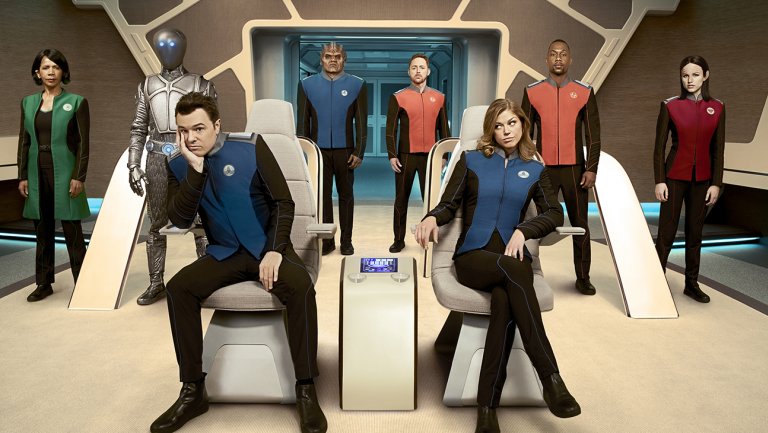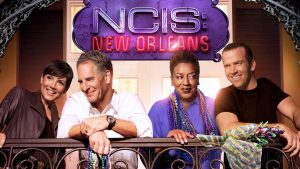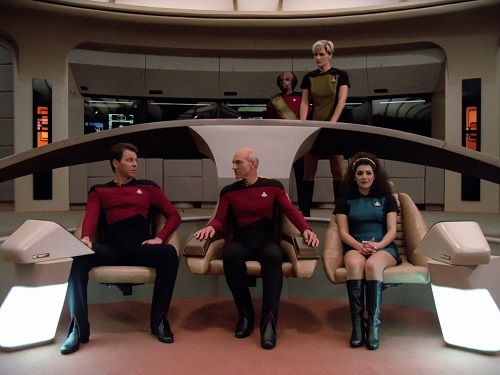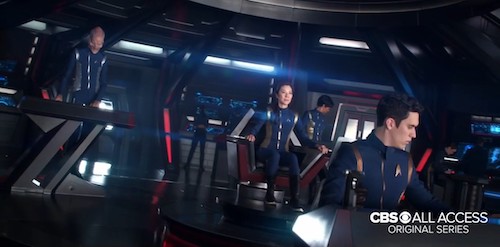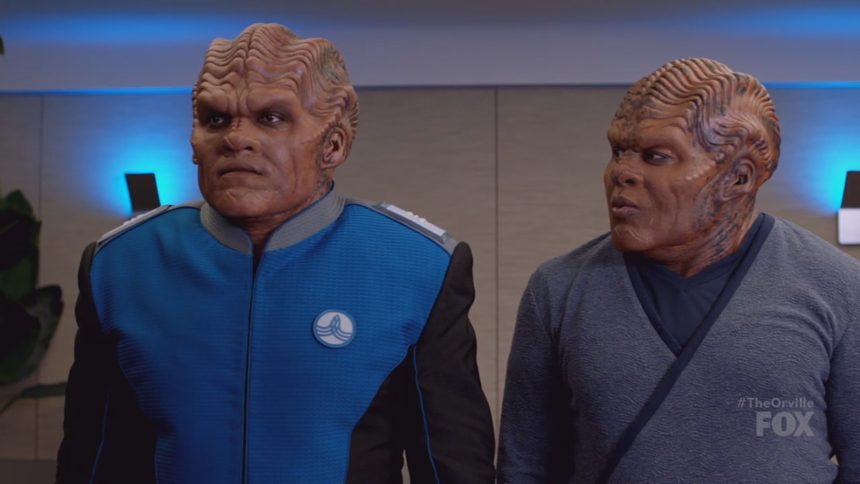Star Trek is an enormous and complex cultural entity whose impact on politics, technology, and storytelling are undeniable. It’s also as flawed and problematic as any other massive media franchise. Lifelong Trekkie and Deadshirt Editor-in-Chief Dylan Roth attempts to make sense of it all for die-hards and outsiders alike in his recurring column: Infinite Diversity.
“As for me, things have started to feel… a little… episodic. The farther out we go, the more I find myself wondering what it is we’re trying to accomplish.”
– Captain James T. Kirk (Star Trek Beyond)
Last month saw the debut of two new space adventure series on American television: Star Trek: Discovery, an ambitious serialized drama that’s serving as the flagship for CBS’s new subscription streaming service, CBS All Access; and FOX’s The Orville, created, produced, written by and starring Seth MacFarlane of Family Guy fame, ostensibly a hybrid of Rick Berman-era Star Trek and workplace comedy. The Orville has the pedigree of longtime Trek producer Brannon Braga, while Discovery is led by a mostly new creative team but carries the Star Trek name. Even before either show launched, longtime Trek fans began arguing the comparative merits of the two shows. Which one is really Star Trek? It’s less of an obvious answer than it seems—while The Orville could easily be classified as a glorified self-insert fan fiction, in a manner of speaking all new Star Trek created since 1991 has been fan fiction. Now that both shows are out in the world, the answer seems to be that both shows are sorta Star Trek. The Orville is More Star Trek, Discovery is New Star Trek.
Planet (Development) Hell
Before going any further, I should admit that I have some biases going into watching each show. Since CBS announced their intention to bring Star Trek back to television back in 2015, I’ve naturally been excited to see the franchise to return to the medium where it belongs. Call it stupid brand loyalty, but my attachment to and association with Star Trek means I’m always going to root for a show called Star Trek to be good. No one wants to have written tens of thousands of words about a media franchise that sucks.
The more pre-production detail that was revealed about the Star Trek: Discovery, the more encouraged I became. Bryan Fuller was my very first choice to helm a new Trek series—an ambitious showrunner with contemporary sensibilities who would be unlikely to settle for more of the same, but also someone who has a history with the franchise and a love and respect for its ideals—and I was thrilled to hear that he would be creating and running the show. Casting Sonequa Martin-Green as its star and delivering on a thirty-year-old promise of having gay characters represented on screen (in Anthony Rapp’s Paul Stamets) signaled that this Star Trek would represent the ideals of diversity professed (but often ignored) by previous installments. I even saw the multiple production delays as a sign that CBS took the project seriously, and was more concerned with making the show good than getting it out on time. (A hasty launch is part of what torpedoed Enterprise in 2001.) Although apprehensive about the paywall for All Access and what it might mean for viewership in the US, I can’t overstate my relief in learning that Star Trek: Discovery would not air on CBS proper. CBS does not make ambitious television, and I don’t want to watch NCIS: 2256.
My confidence was shaken once Bryan Fuller was booted from the production for spending too much time working on his other CBS-adjacent series, American Gods, and then again once I saw the uninspiring early trailers, and again upon the reveal of the bland, unmemorable opening theme. (I know it’s a small thing but it’s a pet peeve and I really blew my stack over it, so much that I went and composed my own.) But when Discovery finally premiered, a lot of my fears were assuaged, and I had a fantastic time with the opening episodes.
On the other hand, I was against The Orville from the word “go.” Seth MacFarlane is a well-known Star Trek fanatic (to the point that he actually played a bit part on Enterprise) but also an insensitive privileged idiot who has made his fortune appealing to frat boy humor that plays to the basest South Parkian “other”-bashing instincts of the American public. Apart from muscling Fox into producing and airing the educational miniseries Cosmos: A Spacetime Odyssey, none of his previous work seems to demonstrate that he has any understanding of what Star Trek is about at all. I fully expected The Orville to be garbage, and knowing that Discovery’s paid online distribution would guarantee it fewer domestic viewers than The Orville was pissing me off weeks before either show even hit the airwaves.
Like Discovery, The Orville’s upfronts trailers were unimpressive, even groanworthy. The show looked cheap, and the sizzle reel was packed with unfunny jokes and some very familiar visuals that look like Voyager with the serial numbers filed off. After the lukewarm response to the first trailers, The Orville press tour first leaned into the idea that the show isn’t really a comedy, more of a light-hearted space adventure show that’s occupying the vacuum left behind by Trek and sci-fi in general getting darker. When the pilot episode aired and the first reviews came in, I felt pretty secure in my decision to skip it. It wasn’t until two weeks later that I heard anything positive about the show that I became curious enough to actually give it a watch. I’ll get more into the details of that later, but first, allow me this digression:
The Star Trek Style Guide
In my review of the two-part Discovery premiere, I wrote a lot about how the new series is a departure from the rigid visual and structural standards that dominated Star Trek television from 1987 to 2005. I think there’s no better way to illustrate the roles that Discovery and The Orville each play as successors to Star Trek than to outline just how much they each have in common with that wave of Trek.
Here’s a list of things that The Orville has in common with TNG-era Trek (including Enterprise) that Discovery doesn’t (so far):
- Bright, even TV lighting
- Distinctive color-coded uniforms (yes, Discovery has those gold, silver, and bronze shoulder stripes but you get what I mean)
- A memorable opening theme played over effects shots of the titular ship soaring through space
- Neat, self-contained hour-long episodes
- Clear, if heavy-handed social commentary
- Bad jokes, albeit The Orville has a lot more of them
- Stories
ripped offadapted from previous Star Trek series - A holodeck
- Executive Producer Brannon Braga
- Actress Penny Johnston Gerald (formerly Deep Space Nine‘s Captain Yates, now The Orville‘s Dr. Finn)
- Directors Robert Duncan McNeill, James T. Conway,
and Jonathan Frakes
Here’s a list of things that Discovery has in common with TNG-era Trek that The Orville doesn’t:
- Permission to use copyrighted names or concepts from previously published Star Trek works such as Starfleet, Klingons, & Ambassador Sarek
- Producers Bryan Fuller and Joe Menosky, plus Rod Roddenberry (son of Gene)
Director Jonathan Frakes(he’s shot both shows)- Dialogue that in no way resembles real conversation
That’s about it.
When attempting to continue a franchise—fuck it—when attempting to create any work of art or entertainment, an important question to ask is “What am I doing that hasn’t been done? What am I adding to the fabric of the universe?” I struggle with this as an artist and a songwriter myself. Is my band just “more rock music?” Am I saying anything that hasn’t been said before? Why should anyone listen to me rather than the enormous archive of existing music that’s readily accessible? I don’t have easy answers to those questions, but while I search for whatever it is that makes me and my art special, I continue to do it because I love doing it. It brings me joy, and I’m fortunate that it seems to bring joy to others as well. But if we never do anything that’s truly new, it’s likely that we’ll eventually be forgotten in favor of other bands who did what we do first, or better.
The Orville is clearly made with a deep love and respect for all of the Star Trek that came before. This is likely the show Seth MacFarlane has been dreaming of making his entire life. The reason for him to make this show is clear. But when I look at the series so far, a scant four episodes in, and ask the question of “What is this doing that hasn’t been done?” I come up with very little, which doesn’t provide a lot of motivation to watch. The most obvious difference between The Orville and Star Trek: Voyager (which I consider its closest analog, in tone if not in plot) is that The Orville is ostensibly supposed to be funny. There’s more witty banter in The Orville than on even the sunniest, silliest classic Trek episode, but the jokes are almost all tacked-on, as if someone wrote a Star Trek script, turned it in, and then had comedians do some punch-up. In a sitcom, the comedy comes from the situation. On The Orville, the comedy comes only from the characters’ responses to standard sci-fi drama plots. They break tension with humor, they crack jokes with each other, but the comedy is not actually derived from the story. You can remove most of the jokes from an episode and nothing would be lost. Sometimes it’s a nice break from the stuffy Star Trek dialogue that persists even on Discovery—the characters on The Orville are not (so far) complex or interesting, but they talk like real people and that’s very uncommon in sci-fi TV. But is it really adding anything of substance? Not really.
We All Need to Do Better
So if you’re not going to do anything new, if you’re just going to make more of the same Star Trek, then you’d better make some good Star Trek. Its third episode, “About a Girl,” is the one that drew me into watching the show, after hearing just that praise from a trusted friend—”It’s good Star Trek.”
Spoilers ahead for the episode.
In “About a Girl,” an Orville bridge officer, Commander Bortus (Peter Macon), and his husband Klyden (Chad L. Coleman) give birth to a baby girl. The issue: their species, the Moclans, are almost all male, with a female being born only once in a few generations. The crew is shocked to learn that it is customary for a Moclan girl to receive gender reassignment surgery at birth to avoid the stigma of living with the “handicap” of being female. At first, both parents are in favor of the procedure and it’s only the non-Moclan crew who oppose it, but after being screened the Rankin-Bass classic Rudolph the Red-Nosed Reindeer, Bortus realizes that removing what makes his child different is denying her the ability to discover her own potential. This creates a dispute between Bortus, Klyden (who reveals that he himself was born female and is thankful for the operation), and the Moclan government. Despite a rigorous defense of womanhood led by first officer Commander Kelly Grayson (Adrianne Palicki), the Moclan government rules in favor of Klyden, and the child receives the operation. Despite their fight, Bortus and Klyden still love each other, and Bortus pledges that he will create the best life that he can for his child, regardless of their gender.
So, on the plus side, The Orville one-ups Roddenberry and Berman both in their portrayal of a loving marriage between two men, tells a story about gender, disabilities, and misogyny all wrapped up together in one analogy. But Seth MacFarlane (who is credited with writing this and all other episodes that have aired so far) makes the same mistakes that Star Trek did nearly every time it tried to talk about gender and sexuality, and those are 1) conflating gender and sexuality and 2) failing to establish that there is a place for queer human beings in this utopian future. At no point in “About a Girl” is there any discussion about whether or not simply assigning the baby girl with male sex organs is going to change her gender. It’s simply assumed that any Moclan will identify with their sex organs. And okay, we’ve got an alien species here, so who’s to assume how their gender works—we’re talking about aliens who identify as male but they all lay eggs and are capable of fertilizing said eggs, so maybe our concepts of sex and gender don’t totally apply here. The issue is that such an assumption plays totally opposite to the subject of the analogy the episode is written around, which could confuse the lesson the audience is meant to learn.
Early in the episode, Captain Mercer (MacFarlane) suggests “Why don’t we wait until she gets older and see what she decides?” which implies that this is how gender identity is handled among humans in the 25th century, but the implication isn’t enough. Yes, this is science fiction and sci-fi works best when you recontextualize a contemporary issue so that an audience that may not understand it can see it from a new point of view, but in today’s media, we expect both text and subtext. You need only look to the fact that in order for The Orville to have a gay couple in the cast, they needed to invent a species that essentially has no women. There are still cheap shortcuts being made to allow the show to pat itself on the back for its progressive ideals while still denying on-screen representation to those they claim to champion.
“About a Girl” is a good episode, and I think its central metaphor is a great way to present an important issue to a stubborn viewership. I do think it counts as “good Star Trek,” but only based on the standard of existing Star Trek produced 20 years ago. The issue is that it’s not “good Star Trek” for today. Today I expect better Star Trek. If The Orville wants to be a successor to The Next Generation, then it can’t have the same hangups as the last generation.
I’m not letting Discovery off the hook here, either. Having a black leading lady or a gay supporting character should not be seen as groundbreaking in the year 2017. If Discovery really wanted to push the casting envelope the way Star Trek did in 1966, there’d be a practicing Muslim security chief and a trans woman at the helm. I still want to see those things from Discovery. But Discovery is bringing other new things to the table, and as a result I have more patience with it. And this is where Seth MacFarlane’s history as a cheap-ass comedian comes into play, because I have absolutely no faith that The Orville is going to beat Discovery to putting the first trans, nonbinary, or asexual human character in their uniform. I don’t know that Discovery is going to do it, but I can pretty much guarantee that The Orville won’t, or that if they do, it’ll be offensive or embarrassing.
It’s way too early into Discovery to know what the message of the show is going to be or how it’s going to be conveyed. That series has the benefit of its 15-episode seasonal arc structure, so fans and critics will have to give it some time to play out. The Orville, like old Star Trek, doesn’t have that excuse. Every episode is a complete story with an opportunity to say something. And man, they’re trying, and I can appreciate that. What’s more, as Discovery continues to get darker and scarier, I also have to admit that I do still crave the kind of brightly-lit, wrapped-up-in-40 optimistic sci-fi that The Orville stands for. But if they want to be anything more than “more Star Trek,” then Seth MacFarlane and company are going to have to go a little more boldly.
Infinite Diversity will return to explore Discovery in more detail after its mid-season break. In the meantime, if you have an idea for a topic for a future installment, or just want to talk about Trek, drop me a line @DylanRoth on Twitter. Also, special thanks to @LeahStarkest for her help with pronouns and terminology.

